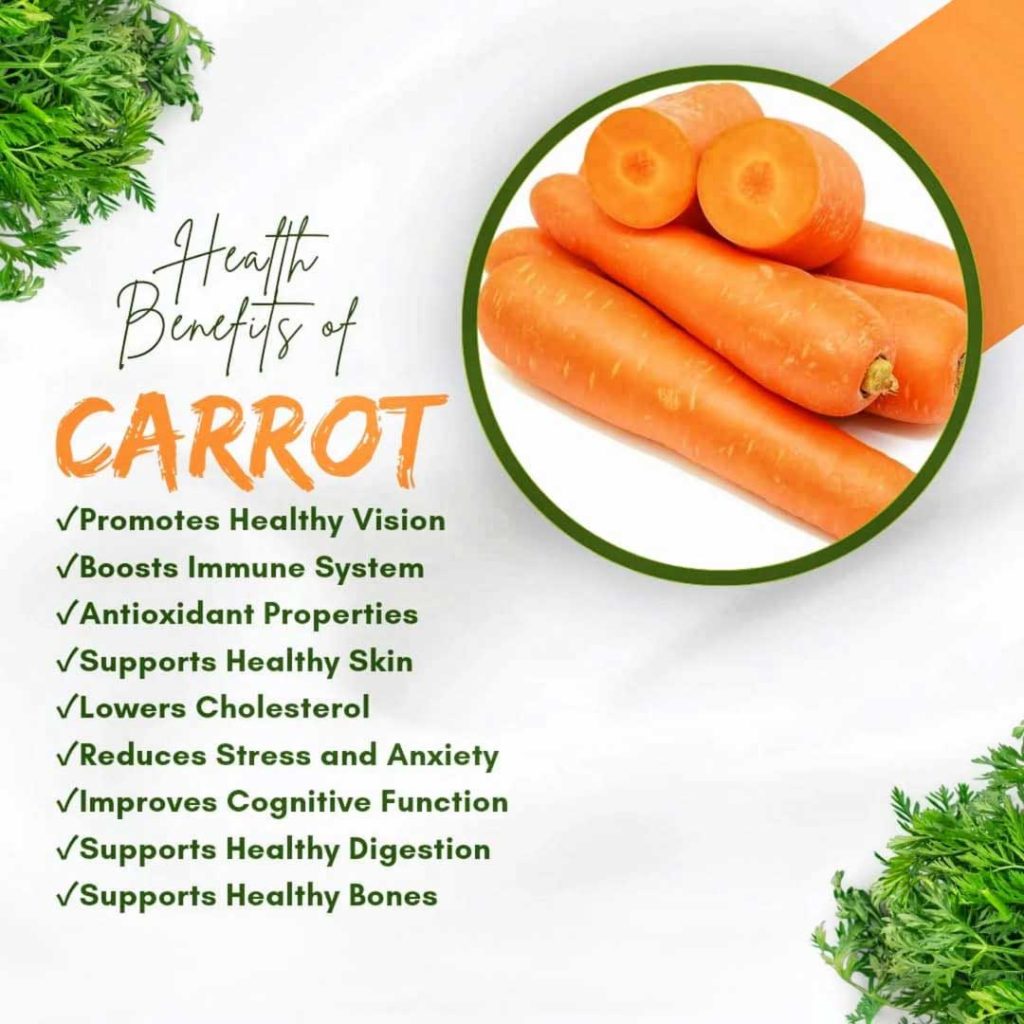Carrots are among the most popular root vegetables worldwide, known for their bright orange color and sweet, crunchy taste. But beyond their delicious flavor, they are packed with nutrients that offer numerous health benefits. From improving eyesight to boosting heart health, carrots are a powerhouse of vitamins and minerals. Let’s dive into the many ways carrots contribute to overall well-being.
Nutritional Profile of Carrots
Carrots are loaded with essential nutrients, including:
- Vitamins: Rich in vitamin A (beta-carotene), vitamin C, and vitamin K1
- Minerals: Contain potassium, calcium, and iron
- Antioxidants: Beta-carotene, lutein, and polyphenols help fight free radicals
- Fiber: Supports digestion and promotes gut health
- Low Calories: A great addition to a weight-loss diet
Carrots and Eye Health
Carrots are famously known for improving vision. They contain beta-carotene, which is converted into vitamin A in the body. Vitamin A is crucial for maintaining good eyesight and preventing night blindness. Additionally, lutein in carrots protects against age-related macular degeneration.
Boosting Immunity with Carrots
Carrots are rich in vitamin C and antioxidants, which help strengthen the immune system. These nutrients boost white blood cell production, allowing fight infections, colds, and flu. Eating carrots regularly can keep your immune system strong and resilient.
Carrots for Heart Health
Eating carrots may reduce the risk of heart disease by:
- Lowering cholesterol levels: Fiber in carrots helps remove excess cholesterol from the body.
- Regulating blood pressure: Potassium in carrots helps control blood pressure levels.
- Preventing oxidative stress: Antioxidants protect the heart from damage caused by free radicals.
Weight Loss Benefits of Carrots
Carrots are a great snack for those trying to lose weight because:
- They are low in calories and high in water content.
- The fiber in carrots keeps you full for longer, reducing hunger.
- They help in digestion and metabolism, aiding weight management.
Carrots and Digestive Health
Carrots are an excellent source of dietary fiber, which:
- Promotes regular bowel movements
- Prevents constipation
- Supports the growth of healthy gut bacteria
Eating raw or cooked carrots can help maintain a healthy digestive system.
Regulating Blood Sugar Levels
Despite their slightly sweet taste, carrots have a low glycemic index (GI) and do not cause major blood sugar spikes. Their fiber content helps regulate glucose absorption, making them a healthy choice for people with diabetes.
Carrots for Skin Health
Carrots contribute to glowing and youthful skin due to:
- Vitamin A: Prevents dry skin and wrinkles.
- Antioxidants: Protect the skin from sun damage.
- Hydration: Carrots contain water, keeping the skin moisturized.
Carrots and Cancer Prevention
Carrots contain powerful antioxidants and phytochemicals, which help reduce the risk of certain cancers, such as:
- Lung cancer
- Colorectal cancer
- Breast cancer
Beta-carotene and falcarinol, found in carrots, are known for their cancer-fighting properties.
Bone Health Benefits of Carrots
Carrots contain vitamin K and calcium, contributing to stronger bones and reducing osteoporosis risk. Regular consumption helps maintain bone density, especially in older adults.
Carrots and Brain Function
Carrots are beneficial for brain health due to their high antioxidant content. They help:
- Reduce oxidative stress in the brain
- Improve memory and cognitive function
- Lower the risk of neurodegenerative diseases like Alzheimer’s
Carrots for Detoxification
Carrots help in detoxifying the body by:
- Supporting liver function
- Flushing out toxins through fiber
- Acting as a natural diuretic to remove excess fluids
Carrots During Pregnancy
Pregnant women can benefit from eating carrots as they:
- Provide essential vitamins for fetal development
- Help in maintaining healthy blood pressure
- Support immune health for both mother and baby
How to Incorporate Carrots into Your Diet
You can enjoy carrots in various ways, such as:
- Raw (snack with hummus)
- Juices and smoothies
- Cooked in soups and stews
- Roasted as a side dish
- Grated in salads
Best Time to Eat Carrots
The best time to eat carrots depends on your goals:
- Morning: Best for energy and digestion
- Before meals: Helps with satiety and weight control
- Evening: Good for skin repair and detoxification
Raw vs. Cooked Carrots: Which is Healthier?
Both have benefits:
- Raw carrots: Higher in fiber, good for digestion
- Cooked carrots: Release more beta-carotene, making vitamin A more bioavailable
Side Effects of Overconsumption of Carrots
Eating too many carrots may lead to the following:
- Carotenemia (yellowish-orange skin discoloration)
- Digestive issues (excess fiber can cause bloating)
- Increased sugar intake (for diabetics)
FAQs
How many carrots should I eat per day?
Eating 1-2 medium-sized carrots a day is a healthy amount.
Are raw carrots healthier than cooked ones?
Both have benefits; raw carrots are higher in fiber, while cooked ones provide more bioavailable beta-carotene.
Can carrots help with acne?
Vitamin A and carrots’ antioxidants help reduce acne and improve skin health.
Are carrots good for people with diabetes?
Yes, their low glycemic index makes them safe for diabetes management.
Do carrots help with weight loss?
Yes, they are low in calories and high in fiber, promoting fullness.
Can I drink carrot juice daily?
Yes, but in moderation to avoid excess sugar intake.
Conclusion
Carrots are an incredibly nutritious vegetable that supports overall health, from vision improvement to heart and skin benefits. Adding them to your diet in various forms can enhance your well-being and longevity. Start enjoying more carrots today for a healthier future!

